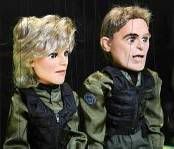(Please follow the link for the complete interview.)
James McAvoy Is A Different Kind of Hero In "Wanted"
Friday, 27 June 2008
By Christina Radish
Wesley Gibson (James McAvoy) is a slacker who hates his life. At work, his boss lives to torment him in front of his fellow cube-dwelling drones. Back home, his girlfriend is cheating on him with his supposed best friend. Fortunately for Wes, all that changes when he meets Fox (Angelina Jolie), a deadly sexy woman who tells him that his estranged father was killed while working for a centuries-old league of trained assassins, called the Fraternity, led by the enigmatic Sloan (Morgan Freeman). Now, it’s Wes’ turn to follow in his father’s footsteps and realize his true potential. The former loser quickly grows to enjoy all the strength he ever wanted, but he also begins to realize that there is more to his dangerous associates than meets the eye, as he learns that he alone controls his destiny.
In bringing Wanted from comic book to big screen, Russian director Timur Bekmambetov knew that Scottish actor James McAvoy was the perfect choice to play this different kind of hero. McAvoy spoke to MediaBlvd Magazine about the Universal Pictures action thriller, and what it was like making such a stunts-laden film.
A brief excerpt:
MediaBlvd Magazine> Initially, Wesley is a loser, but even within your facial expressions throughout the film, there’s an amazing transformation that you make. What was the process that you went through, as an actor, in order to do that?
James McAvoy> One of the things that really attracted me to the film was that it was a big, silly piece of entertainment, of course, but that the basis of the journey, and the basis from which we create this action hero, or anti-hero, is that he’s this clinically depressed person. He’s a real sufferer of post-modern depression, apathy and angst, and I thought that was a quite true and sad place to begin. It was important for me that it wasn’t all done just with costume, which is easy to do. Although, we did do it with costume as well because, as soon as he goes to the Fraternity, he wears new clothes. So, it was important for me that the journey still had a long way to go, and that’s done physically, like just walking taller when you’re further on in the film, and how you wear your shoulders, and facially. Wesley is so dis-empowered, it’s very difficult for him to take control of his face. He’s so dis-empowered, it’s very difficult for him to mobilize his face. He gets more expressive as the film goes on, which hopefully signifies more self-worth and willingness to communicate because you feel powerful in your space, and all of that. So, I didn’t prepare for it too much, but those were the things that I thought about, when I was thinking about how to plot the journey. He starts in a very interesting, depressed place, and he ends in a very interesting, psychopathic place, but the most interesting thing is how he gets from A to B.



No comments:
Post a Comment